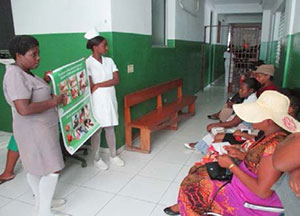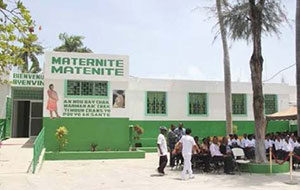
Maternal nutrition is a critical part of prenatal care and good pregnancy outcomes—and sometimes little things can encourage better care-seeking and continuity of care. Margarette, pregnant with her second child, now looks forward to her visits to the Hôpital Immaculée Conception des Cayes in southern Haiti for prenatal care. “Clean walls, clean floor—they have made some great improvements in the maternity unit. Hôpital des Cayes is so welcoming now. I will definitely continue to come for my visits,” she said.
The maternity unit at the Hôpital Immaculée Conception des Cayes wasn’t always so welcoming and clean. This is an important health facility and reference hospital for the southern department of Haiti, providing nutrition assessment, counseling, and support (NACS) to vulnerable populations. The hospital was severely damaged by floods that ravaged the area. Noticing that women didn’t want to spend time in the clinic, the facility director requested help from SPRING to restore the maternity unit’s infrastructure. An improved facility would encourage pregnant mothers to come for prenatal care, follow-up visits, and educational training.
Our clothes used to get dirty when we came to clinic visits,” a woman in the waiting room remembers, adding that now, “The floor is clean and walls are not soiled. It gives us a sense of respect and encourages us to come.
--a clinic client
Responding to this need across Haiti, SPRING/Haiti set up an innovation fund and encouraged facilities to identify low-cost, practical solutions to problems they identified. The grants motivated health facilities to devise creative solutions and plan small actions to bolster nutrition services. These simple, inexpensive solutions included purchasing screens and curtains to ensure privacy during NACS; providing fans and benches to improve client comfort and make the clinic waiting areas more accommodating; installing TVs and DVD players to play health messages for clients in the waiting area; and brightening walls in the pediatric units with paint, murals, and cartoon decals.

Hôpital Immaculée Conception des Cayes requested support for basic, essential upgrades, including repainting of the maternity unit and simple furnishings to store supplementary foods and nutrition equipment. In addition to fulfilling these requests, SPRING/Haiti donated educational materials to the hospital for the dissemination of key nutrition messages. These changes increased overall cleanliness of the maternity unit, dramatically improving the facility’s appearance and perceptions of service quality.
Minimal investments like these led to significant quality improvements in each of the 15 facilities SPRING assisted. Such changes are especially critical for Haiti’s NACS initiatives, which hinge on the willingness of patients to make return visits to facilities. Currently, 36 trained staff at the Hôpital Immaculée des Cayes lead group nutrition education in pediatric, maternity, and HIV/Tuberculosis target units. While clients sit in the waiting rooms of the newly renovated hospital, they can view SPRING/Haiti’s nutrition-related videos.
Margarette has benefitted greatly from NACS group trainings; during her prenatal visits, she learned about nutrition and the importance of exclusive breastfeeding. Thanks to simple facility enhancements and the availability of NACS information and trainings, Margarette and other women in southern Haiti have better access to prenatal care and information about infant and child nutrition.